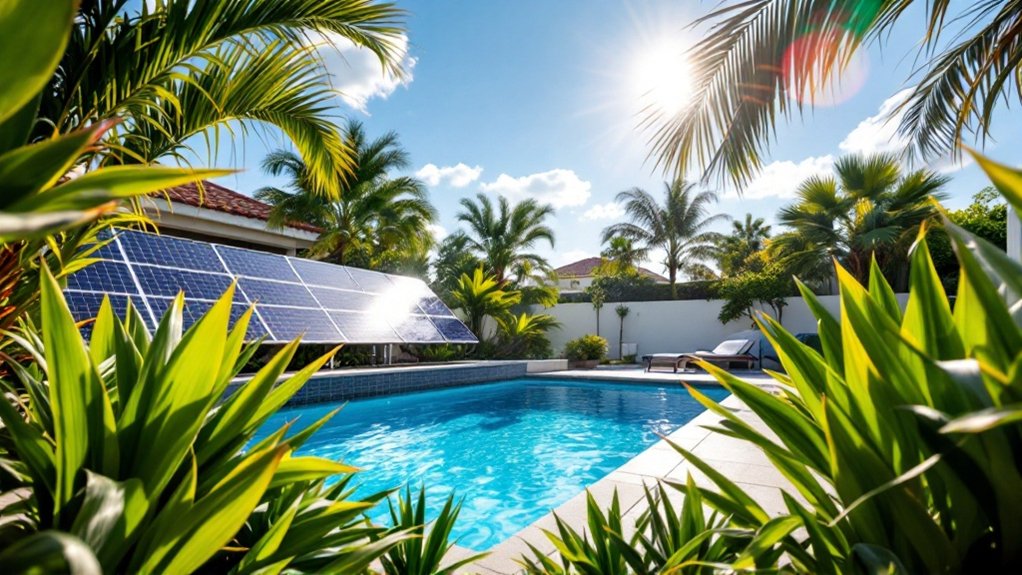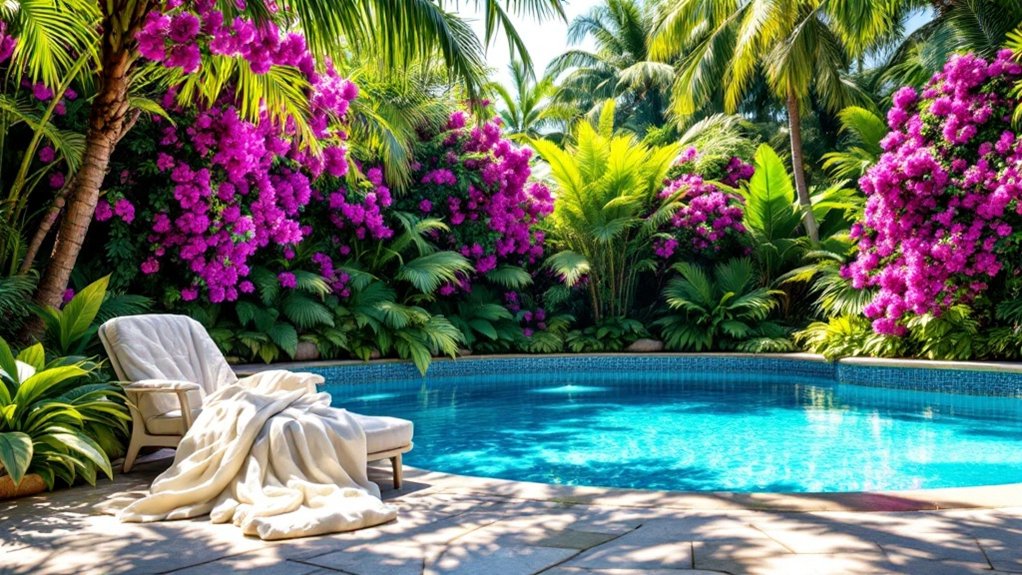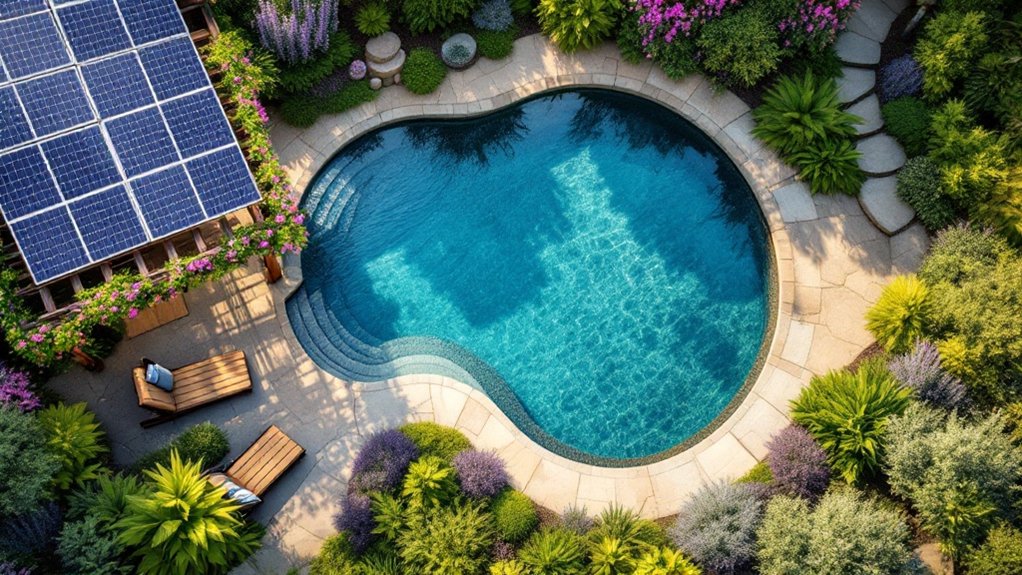Heating a pool sustainably is becoming increasingly important for environmentally conscious homeowners. Various methods exist, each offering unique benefits and efficiencies. From solar heating systems that harness the sun’s power to energy-efficient heat pumps that utilize ambient air, options abound. Additionally, simple techniques like pool covers can enhance heat retention. Understanding these solutions can lead to a more sustainable and enjoyable swimming experience. The question remains: which method is the best fit for your needs?
Solar Heating Systems
How can pool owners embrace eco-friendly solutions while enjoying warm water? Solar heating systems offer an effective way to achieve this goal. These systems utilize solar panels to capture sunlight and convert it into heat, which is then transferred to the pool water. By harnessing renewable energy, pool owners can greatly reduce their reliance on fossil fuels and lower their energy costs. Installation options range from rooftop-mounted panels to ground-based systems, allowing for flexibility based on property layout. Additionally, solar heaters can extend the swimming season, providing warmth without the environmental impact associated with traditional heating methods. As awareness of climate change increases, adopting solar heating is a prudent choice for eco-conscious pool owners seeking sustainable solutions.
Energy-Efficient Heat Pumps
Many pool owners are turning to energy-efficient heat pumps as a viable alternative for heating their pools sustainably. These systems utilize electricity to transfer heat from the air or ground to warm the pool water, making them markedly more efficient than traditional gas heaters. By extracting heat from the environment, heat pumps can provide substantial energy savings, reducing both operational costs and environmental impact. They typically operate efficiently even in cooler temperatures, ensuring consistent heating throughout the swimming season. Additionally, many models are designed with advanced technology that optimizes performance and minimizes energy consumption. As sustainability becomes increasingly important, energy-efficient heat pumps represent an effective solution for pool owners looking to balance comfort with eco-consciousness.
Pool Covers and Blankets
While utilizing energy-efficient heat pumps greatly enhances pool heating sustainability, incorporating pool covers and blankets can further bolster energy conservation efforts. These covers act as a barrier between the pool water and the surrounding environment, markedly reducing evaporation and heat loss. By retaining warmth, pool covers can help maintain a comfortable water temperature, minimizing the need for additional heating. Additionally, using a blanket or cover can protect the pool from debris, reducing maintenance time and costs. Various materials are available, including solar covers that harness sunlight to warm the water during the day. Overall, integrating pool covers and blankets not only promotes energy efficiency but also extends the swimming season, enhancing the overall enjoyment of the pool. Regular maintenance of water quality is essential to ensure that the pool remains safe and enjoyable for swimmers.
Heat Retention Techniques
Effective heat retention techniques are essential for maintaining pool temperatures sustainably. Solar pool covers and wind block barriers are two methods that can markedly reduce heat loss. Implementing these strategies can lead to more efficient heating and extended swimming seasons.
Solar Pool Covers
A considerable number of pool owners are turning to solar pool covers as an efficient solution for heat retention. These covers, typically made from durable, UV-resistant materials, utilize solar energy to warm the water while minimizing heat loss during cooler nights. By trapping sunlight, they can greatly increase the pool temperature, allowing for extended swimming seasons without additional energy costs. Furthermore, solar pool covers help reduce evaporation, which conserves water and minimizes the need for chemical treatments. Their lightweight design makes them easy to handle and store, while various sizes and shapes cater to different pool types. Overall, solar pool covers represent a practical and sustainable approach to maintaining pool warmth effectively.
Wind Block Barriers
How can pool owners enhance heat retention while minimizing energy costs? One effective solution is the installation of wind block barriers. These barriers, which can include fences, shrubs, or specially designed screens, serve to reduce the wind’s impact on water surface temperatures. By obstructing cold winds, they help maintain a warmer pool environment, ultimately reducing the need for additional heating. Moreover, wind block barriers can notably decrease evaporation rates, which is another contributor to heat loss. When strategically placed, these barriers not only enhance comfort for swimmers but also contribute to energy savings. By incorporating wind block barriers, pool owners can create a more sustainable heating solution while enjoying their outdoor spaces year-round.
Windbreaks and Landscaping
Windbreaks and landscaping play an essential role in enhancing the efficiency of pool heating. Strategic placement of trees, shrubs, and fences can considerably reduce wind exposure, minimizing heat loss from the pool. By acting as a barrier, windbreaks help maintain water temperature, allowing for more efficient use of solar heating systems or heat pumps.
In addition to their practical benefits, aesthetically pleasing landscaping can create a more inviting environment around the pool. Native plants and well-placed greenery not only provide natural beauty but also require less water and maintenance.
Incorporating windbreaks and thoughtful landscaping into pool design not only supports sustainable heating practices but also enhances the overall enjoyment and visual appeal of the pool area.
Biomass and Alternative Heating Methods
Biomass heating systems and solar pool heating represent two innovative approaches to sustainable pool heating. By utilizing renewable resources, these methods not only reduce energy costs but also minimize environmental impact. Exploring these alternatives can lead to more eco-friendly and efficient ways to maintain comfortable pool temperatures.
Biomass Heating Systems
An increasing number of pool owners are turning to biomass heating systems as a sustainable alternative to traditional fossil fuel options. These systems utilize organic materials, such as wood pellets or agricultural waste, to generate heat, considerably reducing greenhouse gas emissions. Biomass heating is particularly advantageous due to its renewable nature, as it relies on resources that can be replenished. Additionally, modern biomass boilers can achieve high efficiencies, ensuring effective heating while minimizing fuel consumption. Installation may require a larger upfront investment compared to conventional systems; however, the long-term savings and environmental benefits often outweigh initial costs. As awareness of sustainability grows, biomass heating systems are becoming an increasingly popular choice for eco-conscious pool owners.
Solar Pool Heating
While many pool owners seek eco-friendly heating solutions, solar pool heating stands out as one of the most sustainable options available. This method harnesses the sun’s energy to warm pool water through specially designed solar panels, typically installed on rooftops or nearby structures. By converting sunlight into heat, solar pool heating greatly reduces reliance on fossil fuels and minimizes greenhouse gas emissions.
Moreover, it offers long-term cost savings, as the initial investment is often offset by lower energy bills over time. Maintenance requirements are minimal, and systems can be tailored to fit various pool sizes. With the increasing emphasis on sustainable practices, solar pool heating presents an attractive solution for environmentally conscious pool owners looking to enjoy their pools year-round.
Frequently Asked Questions
How Much Does It Cost to Install Solar Heating Systems?
The cost to install solar heating systems varies widely, typically ranging from $3,000 to $8,000, depending on system size and installation complexity. Long-term savings on energy bills often justify the initial investment.
Can I Use a Regular Heat Pump for My Pool?
Using a regular heat pump for a pool is possible, but it may not be optimized for pool heating. Specialized pool heat pumps are designed for efficient heating, offering better performance and energy savings compared to standard models.
What Materials Are Best for Pool Covers and Blankets?
The best materials for pool covers and blankets include polyethylene for its durability, solar covers for heat retention, and insulated covers for energy efficiency. Each material offers unique benefits tailored to specific pool heating and maintenance needs.
How Do Windbreaks Affect Pool Heating Efficiency?
Windbreaks play an essential role in enhancing pool heating efficiency by reducing evaporation and wind chill. They help maintain water temperature, allowing for more effective heat retention and minimizing the need for additional heating methods.
Are Biomass Heating Methods Safe for My Pool?
The safety of biomass heating methods for pools varies based on system design and maintenance. Properly installed and regularly serviced systems can be safe, but potential risks exist if not managed correctly, necessitating careful consideration.
Conclusion
To summarize, sustainable pool heating can be achieved through a combination of innovative technologies and practical strategies. By utilizing solar heating systems, energy-efficient heat pumps, and effective heat retention methods such as covers and landscaping, pool owners can considerably reduce their environmental impact. Embracing these eco-friendly alternatives not only enhances the swimming experience but also contributes to a greener future. With thoughtful planning and implementation, enjoying a warm pool can align harmoniously with sustainable living practices.




